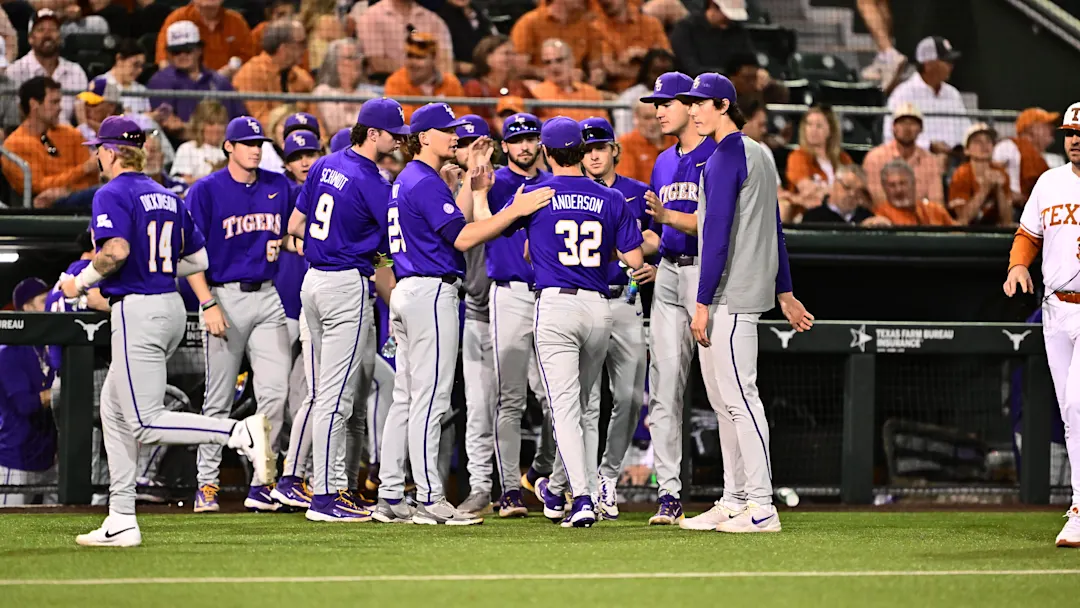In what promises to be a high-stakes clash of college baseball heavyweights, the starting pitchers have been announced for Game 1 of the NCAA Super Regional between the LSU Tigers and the Coastal Carolina Chanticleers. The reveal sets the stage for a thrilling showdown between two programs with deep postseason pedigrees, rich histories, and rosters full of talent hungry for Omaha. The anticipation surrounding this matchup has only intensified with the announcement of the pitchers who will toe the rubber to open the series.
For LSU, it will be junior right-hander Luke Holman getting the nod. A transfer from Alabama, Holman has been a steadying force at the top of the Tigers’ rotation throughout the season. Known for his poise, precision, and ability to miss bats, Holman has been exactly what LSU needed following a turbulent start to the year on the mound. Holman enters the matchup with an 8-3 record and a 2.89 ERA, having logged 91 innings with 111 strikeouts and just 23 walks. His fastball sits in the low-to-mid 90s, but it’s his elite command and sharp slider that make him one of the most effective pitchers in the SEC. Holman’s experience pitching against elite lineups all season long will be crucial against a Coastal Carolina team that thrives on pressure and timely hitting.
On the other side, Coastal Carolina will hand the ball to sophomore sensation Jack Billings, a right-hander who has rapidly developed into the ace of the Chanticleers’ staff. Billings has been lights out in big moments, showing the kind of calm maturity that belies his age. With a 7-2 record and a 3.12 ERA across 84.2 innings, Billings has established himself as a fearless competitor. He mixes four pitches effectively—fastball, curveball, slider, and changeup—with his changeup in particular drawing rave reviews from scouts for its movement and deception. Billings’ last start in the regional final was a masterclass in efficiency, as he threw seven scoreless innings against a red-hot hitting lineup, allowing just three hits and striking out nine.
This pitching duel is emblematic of the larger stakes at play in this Super Regional. For LSU, the journey back to Omaha is about reclaiming its blueblood identity. Last year’s national title run remains fresh in the minds of fans and players alike, and expectations have only grown louder. Holman, in particular, shoulders not just the burden of being the Game 1 starter, but of setting a tone for a team with championship DNA. He has responded to pressure all season with a quiet intensity, often outdueling opposing aces in tight contests. His command of the strike zone and willingness to attack hitters early in the count have been cornerstones of his success.
For Coastal Carolina, the return to prominence on the national stage is a testament to the sustained excellence the program has built under head coach Gary Gilmore. The 2016 national championship was no fluke, and this current squad has the swagger, depth, and chemistry to make another deep run. Billings represents the heart of that ambition. He’s a homegrown product who has blossomed under the coaching staff’s tutelage, and his competitive fire has helped drive the Chanticleers through a tough regional. While the lights are brighter now and the stakes higher, those close to the program believe Billings is built for moments just like this.
The styles of these two pitchers couldn’t be more different. Holman is surgical, efficient, and composed—a technician on the mound. He rarely gives in to hitters, instead trusting his sequencing and location to generate weak contact or swings and misses. Coastal Carolina’s hitters will have to be disciplined early, as Holman thrives when ahead in the count. Getting to him early may be the Chanticleers’ best bet; once Holman settles into a rhythm, he becomes nearly unhittable.
Billings, in contrast, is a fiery competitor who feeds off emotion. He works fast, pitches with an edge, and loves to challenge hitters inside. LSU’s lineup is known for its patience and power, so Billings will need to vary his pitch mix and avoid falling into predictable patterns. His ability to land off-speed pitches for strikes early in counts will be essential to neutralizing the Tigers’ big bats. The challenge is enormous, but Billings has repeatedly shown he’s up to the task.
Much of the offensive pressure will fall on LSU’s dangerous middle-of-the-order, anchored by All-American slugger Tommy White and dynamic outfielder Dylan Crews. White, with his light-tower power and quick hands, has been the engine of LSU’s offense during the postseason. His ability to turn on inside fastballs and punish mistakes makes him a constant threat. Crews, meanwhile, remains one of the most disciplined and complete hitters in college baseball. Together, they form a terrifying tandem that has terrorized pitchers all year. For Billings, pitching carefully to this duo while still being aggressive will require razor-thin precision.
On the Coastal Carolina side, the offense is built on depth, contact, and execution. Shortstop Derek Bender has emerged as the team’s most consistent hitter, batting .351 with 17 home runs and 61 RBIs. He’s a grinder who rarely gives away at-bats and has a knack for delivering in the clutch. Outfielder Graham Brown brings pop from the left side and can change the game with one swing, while leadoff man Tyson Pickett sets the tone with speed and hustle. Holman will have to navigate this lineup with care, as the Chanticleers are known for wearing down pitchers and capitalizing on defensive mistakes.
Defense and bullpen depth may also come into play, especially if this becomes a tightly-contested, low-scoring affair. LSU’s infield has been solid behind Holman, with slick-fielding shortstop Michael Braswell providing stability up the middle and third baseman Jared Jones flashing the leather on hot shots. Coastal Carolina’s defense has been tested all season, and catcher Brock Johnson’s ability to control the running game will be vital in limiting LSU’s aggressive baserunning.
From a strategic standpoint, both coaches will be looking to manage their pitchers’ workloads carefully. LSU head coach Jay Johnson has been deliberate all year in preserving his arms for postseason play, and he’ll be quick to go to the bullpen if he senses fatigue or diminishing command from Holman. Closer Griffin Herring, with his electric fastball and swing-and-miss slider, looms large as a potential game-finisher. Coastal Carolina’s Gilmore has leaned heavily on Billings in big games, but he’s not afraid to pull the plug early if needed. Freshman reliever Noah Adams has stepped up late in the year and could be a key bridge if Billings runs into trouble.
As with all great matchups, Game 1 may come down to who makes the fewest mistakes. One wild pitch, one missed sign, or one hanging slider could be the difference between victory and defeat. The margin for error is slim, and the tension will be palpable from the first pitch.
Beyond the statistics and scouting reports, there is a human element to this clash that makes it especially compelling. Holman is pitching not just for wins but for legacy. A strong performance here could cement his status as one of the most impactful transfers in program history. For Billings, this is a chance to elevate his national profile and etch his name into Coastal Carolina folklore. It’s not just about advancing to Omaha—it’s about proving you belong on the biggest stage in college baseball.
As fans file into the ballpark and national television crews set up for the broadcast, the energy around this Game 1 matchup is unmistakable. Two storied programs, two elite starting pitchers, and one golden ticket to the College World Series on the line. It’s baseball at its purest—drama, talent, pressure, and the unpredictable magic that comes when dreams and destiny collide under the summer sun. For Holman and Billings, it’s time to write their next chapter. The spotlight is on. The moment is here. Let the duel begin.



